Summary of Papal Addresses to CAPP
Key Comments from Over the Years
Pope St. John Paul II
1993 – CAPP’s Founding
“Your Foundation is characterized at the same time by its particular closeness to the Successor of Peter and to the Apostolic See, in an attitude of intelligent listening and active collaboration.”
“Through appropriate initiatives…you intend to deepen the real scope of the Pontifical teachings in social matters, to know all their relevance and beneficial efficacy…while announcing Christian social doctrine and continuously developing it according to the needs of the times”.
1994
“According to a well-defined purpose enshrined in your Statute, the Foundation… “favors initiatives to develop the presence and operation of the Church in the various spheres of contemporary society”. This clause opens up a vast field for making the most of your experience and your inventive skills [and I] encourage you to work with renewed energy.”
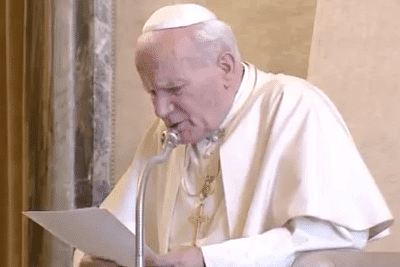
1995
“I…point out various situations…which threaten the life and dignity of the human being…which, in the name of a fallacious progress and on the basis of a false concept of freedom, is spread by those who, powerful and rich, violate the rights of the weak and the poor.”
“These attitudes…lead to the practical negation of a Creator God and natural law [and] ultimately threaten the very survival of the society.”
“It is therefore urgent that all men of goodwill take courageous and constant action to unmask similar widespread pseudo-values and instead promote authentic ethical values, aimed at safeguarding human, individual and social life.”
“I am therefore very comforted to know that you, members of the ‘Centesimus Annus – Pro Pontifice’ Foundation, work to deepen the social teaching of the Church and strive to translate it into practice not only in the context of your businesses, but also how far your professional and Christian action goes.”
“Continue on that demanding mission; always remain united to the Church and support, especially with your prayer, the Supreme Pontiff in the arduous task of proclaiming – ‘opportune et importune’ – the Gospel of Christ.”
1996
“I…congratulate you on your visit, which allows me to follow closely what you are doing in support of the Social Doctrine of the Church in the context of both its deepening and its diffusion and application. This Doctrine, in fact, cannot be considered simply as a theory; it intends first of all to offer a foundation and motivation for a coherent application commitment”.
“Be industrious witnesses of your faith. You will thus contribute actively to the construction of the desired civilization of love, whose first rule is to promote respect for every human being.”
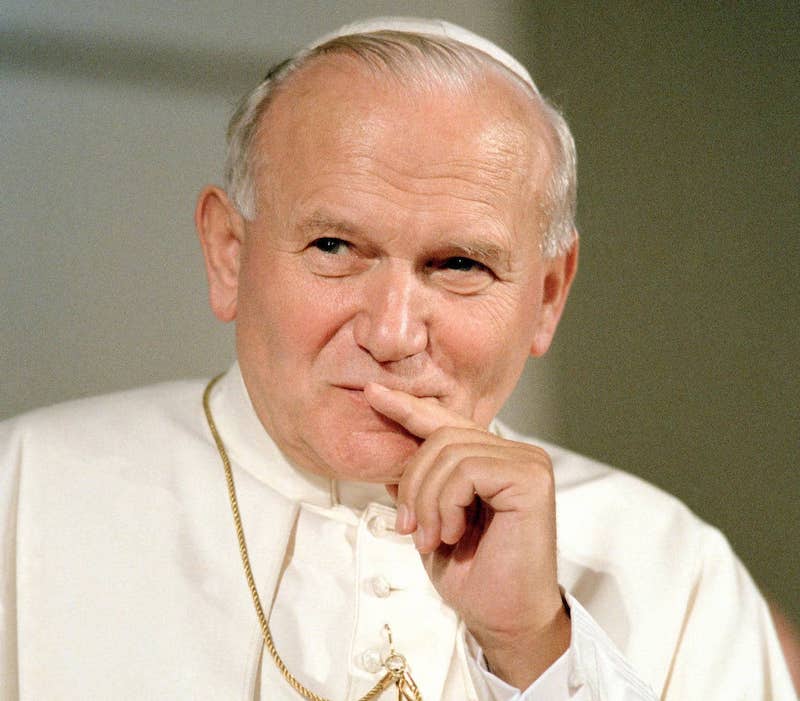
1998
“I…congratulate you on your praiseworthy commitment to spreading and applying the Church’s social doctrine, and I am grateful to you for this visit, which affords me a valuable opportunity to become acquainted with the developments of your laudable activity.”
“[Y]ou…are continually called to interpret the requirements of solidarity according to the spirit of Christ and the Church’s teaching. In this way you will be able to witness to God’s tenderness for every person and to promote, together with the dignity of the person, an international co-existence which is more just and fraternal”.
1999
“I am pleased to be with you again, dear members of the ‘Centesimus Annus Pro Pontifice’ Foundation…the Holy Year 2000 is a great ecclesial event in which your Foundation is called to collaborate”.
“I am aware of your intention to organize an international congress [and] I appreciate such an important initiative and hope that it will bear abundant fruits…I cordially encourage you in this initiative…as I wholeheartedly wish that the Foundation will grow, so that it can ever more effectively work with the Holy See and the Church in the new evangelization and in promoting the civilization of love”.
2002
“I am happy to welcome you to this meeting, with which you wish to renew the sentiments of affection that bind you to the Successor of Peter…Thank you for your visit!”
“I…warmly welcome the members of your association and express my deep pleasure for the work they have accomplished in the course of the past year. This work is highly commendable… For this reason, I desire to show my gratitude”.
“[Y]our foundation is a valid form of lay apostolate. As I had an opportunity to say at our first meeting of 5 June 1993, the Foundation ‘Centesimus annus – Pro Pontifice’ is ‘a significant expression of your involvement as lay faithful’. In fact, to [you] is entrusted the ministry ‘to seek the kingdom of God by engaging in temporal affairs and directing them according to God’s will’.”
“I am grateful to you for your common endeavor, and…you have the task to redouble in a special way every effort for a genuine social renewal, taking the perennial teaching of the Gospel as your reference and the Church’s social doctrine as your guide. May God grant that your generous dedication may be crowned with abundant fruit.”
“As once more I express my esteem and spiritual closeness, I entrust you to the heavenly protection of the Mother of God, so that she may safeguard all of you under her motherly mantle of grace. I cordially impart my blessing to you, to your families and to all your loved ones”.
2003 – FCAPP’s 10th Anniversary
“Today’s meeting is connected to the 10th anniversary of the founding of the Vatican Foundation, ‘Centesimus Annus Pro Pontifice’, which provides a singular response to the invitation I offered in the Encyclical which has inspired this group, to promote and defend the knowledge and the practice of the Church’s social doctrine.”
“The past 10 years have seen the strengthening of the Foundation, the development of study and formation projects – among which is particularly appreciated the Master’s in Social Doctrine, promoted in collaboration with the Pontifical Lateran University”.
“I cannot but rejoice at all this, while I feel I must express a special ‘thank you’ to those who have contributed to putting annually at my disposal precious resources for my evangelical solicitude toward the whole world.”
“I encourage you to continue in your undertaking, always keeping before you three great convictions:
a) The permanent timeliness of the social doctrine of the Church.
[O]ne really must start from a concrete perspective: the truth about man which is discovered by reason and confirmed by the Gospel of Jesus Christ, that proclaims and promotes the true dignity and the innate social vocation of the person.
The social teaching of the Church progressively deepens the different aspects of that truth…and offers indirect incentive for the promotion of human laws, for the tutelage of the family, for the development of truly democratic and participatory political institutions, for an economy at the service of man, for a new international order that guarantees justice together with peace among the peoples, for an ever more responsible moral attitude towards creation, which must also be at the service of future generations.
b) The proper responsibility of the Christian laity.
highlighted by me many times with conviction in the acts of my Magisterium, such responsibility rightly finds in the social doctrine of the Church a necessary, productive and exalting reference point…It is surely a great responsibility that should be seen by the Christian laity not as a limited obligation, but as a generous and creative mission.
c) The awareness that only new men are able to make all things new.
One should not ask of economic, political or social institutions what they are not able to give. Every true newness is born of the heart, from a conscience illuminated and empowered to true liberty by the living encounter with the One who has said: ‘I am the way, and the truth and the life’ and ‘Apart from me you can do nothing’.
The social commitment of the Christian laity can therefore be fed and made consistent, powerful and courageous only by a profound spirituality, that is, by a life of intimate union with Jesus…[and] through the difficult work of building a society closer to the great, providential design of God.
“In offering these guidelines for your expanding task with respect, with hope and with affection, I wish to renew my heartfelt thanks”
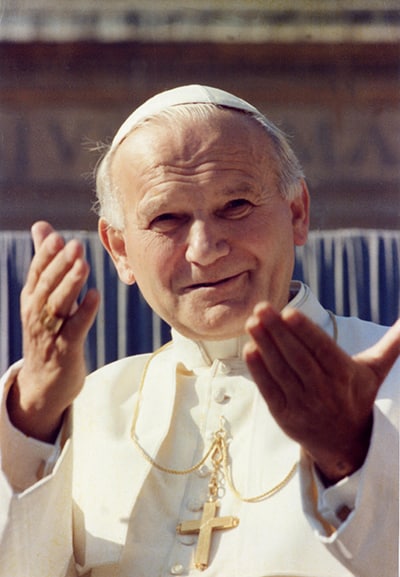
2004 – April
“I take this opportunity to reiterate to this praiseworthy Institution my deep appreciation for the work that it has been carrying out for years at the service of the Church, and particularly of the Successor of Peter.”
“[Y]our Foundation will be able to make its own contribution to protecting the dignity of the person…May God bless your every effort and make your activity fruitful!”
2004 – December
Four months before Pope St. John Paul II’s death he left us this “Last Will & Testament” to the organization he founded.
“I am pleased to address my cordial greeting to you and the members”.
“I was delighted to learn that since its creation just over 10 years ago the Foundation has started to spread in the Dioceses of various Nations and is attracting more and more members. I urge you to persevere in the enterprise on which you have embarked, ever careful to preserve a close relationship with the Pastors of the local Churches.”
“Much remains to be done to ensure that this enriching contribution of ecclesial teaching [CST] becomes a consistent yardstick and a certain force of inspiration for Christian social action. One sometimes has the impression either that the social doctrine of the Church is mentioned rather than known, or that it is seen merely as a horizon of values perhaps too grand and noble ever to be put into practice in this world, rather than a demanding criterion for judgment and action.”
“It is therefore truly important to have a precise, motivated and complete approach to making the Church’s social teaching known so as to avoid stressing any one aspect more than another, swayed by preconceived emotions or views, thus losing sight of its integral structure and using it instrumentally.”
“In addition, people must learn to use this doctrine as a valid reference in the context of family, professional and civil responsibilities. They must accept it as a shared criterion for personal and community decisions and actions”.
“In any case, it will be crucial to understand the social doctrine as an element that characterizes the spirituality of the lay faithful…[which] “steers clear of both intimist spiritualism and social activism and can be expressed in a vital synthesis that confers unity, meaning and hope upon life, which is contradictory and fragmented for many different reasons”.
“I therefore urge the Members to spare no effort to ensure that the Foundation seeks to pursue these goals in full harmony with the Statutes, recently updated after the experience of the first decade.”
Pope Benedict XVI
2006
“I am pleased to be able to meet you for the first time and I greet you all cordially.”
“I would like to express to each of you my appreciation and my gratitude for your service to the Successor of Peter and for the generosity with which you support his apostolic activity […] Our Meeting today, therefore, serves to strengthen you in this generous undertaking.”
“The very name of your Foundation [Centesimus Annus] clearly indicates your goals…[and] says your committed collaboration assists the Church in carrying out her task of spreading the Gospel in a clearly visible way through her social teaching”.
“Pro Pontifice stresses in turn your intention to foster a particular closeness to the pastoral role of the Bishop of Rome”.
“I now see with joy that you are gradually branching out into other areas of Europe and America. The nature of the Vatican Foundation both prepares you for these wide horizons and orients you towards them.”
“Dear friends, through the Centesimus Annus Foundation you contribute…to increasing the knowledge of the social teaching”.
“Returning to your daily responsibilities, may you feel increasingly united in the bond of Catholic communion and live enthusiastically the commitments you have assumed.”
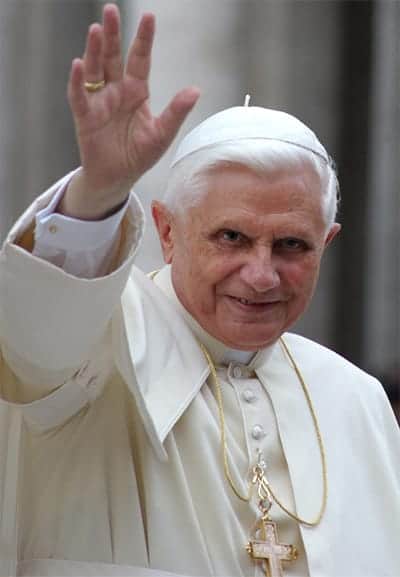
2007
“I am truly pleased to welcome you in this visit that follows the Eucharistic celebration in which you participated this morning in St Peter’s Basilica. My cordial greeting goes to each one of you”.
“In the course of this year’s meeting you reflected on the fundamental commitment that characterizes the Centesimus Annus – Pro Pontifice Foundation: to deepen the most current aspects of the Church’s social doctrine with reference to the most pressing problems and challenges of today’s world.”
“You have, in fact, analyzed the changes taking place in the ’emerging’ countries…In this regard I am pleased to repeat an incisive passage in the Encyclical Centesimus Annus of our beloved John Paul II, where he affirms that “development must not be understood solely in economic terms, but in a way that is fully human”…Here we find a constant teaching of the Church’s social doctrine, often repeated by my Predecessors in these last decades.”
“Dear friends, I know that you, professionals and lay faithful actively committed in the world, want to contribute to resolve these problems in the light of the Church’s social doctrine. Your goal is also to promote a culture of solidarity and to favor economic development attentive to the real expectations of individuals and peoples.”
“While I encourage you to follow this pledge, I would like to confirm that only by the ordered interweaving of the three critically needed aspects of development – economic, social and human – can a free and solidary society be born.”
“In this circumstance, I willingly make my own what Pope Montini expressed with impassioned clarity in his Encyclical Populorum Progressio: “If further development calls for the work of more and more technicians, even more necessary is the deep thought and reflection of wise men in search of a new humanism which will enable modern man to find himself anew by embracing the higher values of love and friendship, of prayer and contemplation” (n. 20).”
“This is your mission; this is the duty that the Lord entrusts to you at the service of the Church and society, and I know that you are carrying it out with zeal and generosity.”
“Thank you, therefore, for this contribution, thank you for what you do and for the commitment with which you dedicate yourselves to the activity of your Association, willed by my venerable Predecessor John Paul II.”
“Upon you and your initiatives, as also upon your families, I invoke the abundant Blessing of God”.
2008
“It is with pleasure that today I meet with you and address my cordial welcome to you…. and I renew the expression of my gratitude for the service that you render to the Church…Dear friends…I renew my gratitude for the generous support that you untiringly lend”.
“I invite you also to offer the contribution of your reflection [on how] to bring about a just economic world order.”
“In this regard, I am pleased to cite an eloquent affirmation…in Gaudium et Spes, [you] ‘can yearn for nothing more ardently than to serve the men of this age with an ever growing generosity and success. Holding loyally to the Gospel, enriched by its resources, and joining forces with all who love and practice justice, they have shouldered a weighty task here on earth…’ (n. 93).”
“Continue your action in this spirit to help so many of our brothers and sisters. On the Last Day, on the Day of the Universal Judgement, we will be asked if we have used what God has put at our disposition to meet the legitimate expectations and needs of our brethren, especially the smallest and neediest.”
“I assure you of a remembrance in prayer and with affection I impart my Apostolic Blessing to you present here, to your families and to those who collaborate with you in your various professional activities.”
2009
“Thank you for your visit…I greet you all with affection and am grateful to you for all that you do, with proven generosity, at the service of the Church…. Our meeting today acquires special meaning and value in the light of the situation that humanity as a whole is experiencing at this time.”
“Indeed, the financial and economic crisis which has hit the industrialized, the emerging and the developing countries, shows clearly that certain economic and financial paradigms…must be rethought.”
“Therefore, at the international congress which took place yesterday…I am pleased to learn that you examined in particular the interdependence between institutions, society and the market, in accordance with my venerable Predecessor John Paul II’s Encyclical, Centesimus annus.”
“I hope that by drawing inspiration from the eternal principles of the Gospel it will be possible, with the research inherent in your work, to elaborate a vision of the modern economy that is respectful of the needs and rights of the weak.”
“My Encyclical dedicated to the vast topic of the economy and work is, as you know, due to be published shortly [n.b., Caritas in Veritate was published 16 days later]. It will highlight what for Christians are the objectives to pursue and the values to promote and to defend…if we are to achieve a truly free and supportive human coexistence.”
“I likewise note with pleasure all that you do for the Pontifical Institute for Arab and Islamic Studies (PISAI), to whose goals you and I attribute great value for an increasingly fruitful interreligious dialogue.”
“Dear friends, thank you once again for coming! I assure each one of you of my remembrance in prayer, while I warmly bless you all.”
2010
“I am pleased to greet you on the occasion of the study Conference promoted by the Centesimus Annus Pro Pontifice Foundation…I also extend a greeting to you, Counsellors and Members of the Foundation, who have wished to visit me with your families.”
“I was glad to see that the central focus of your meeting is reflection on the relationship between ‘development, progress, common good’…Without the common good as a universal reference point, one cannot say that a true global ethos exists”
“Indeed, the common good is made up of many goods: material, cognitive and institutional goods, and moral and spiritual goods. The latter are superior to the former…Therefore, besides economic assistance, there must be aid intended to reinforce the real guarantees of a State of law, a system of true and efficient public order, in full respect of human rights, along with truly democratic and participative institutions”.
“Dear friends, the Christian vision of development, progress and the common good the way it emerges from the Social Doctrine of the Church responds to man’s deepest expectations and your commitment to delve into it and to disseminate it is a valid contribution towards the edification of ‘the civilization of love’.”
“However, what is fundamental and a priority…is to make every effort to recognize [that] a notion of integral human good exists [only] when there is a telos, an end, in the light of which growth is considered and desired.”
“In this, religions are crucial…because they teach people to make room for God and to be open to the Transcendent, especially in our society marked by secularization.”
“The exclusion of religions from the public sphere…impedes the encounter of peoples and their collaboration for the progress of humanity. The life of society is drained of its motivation and politics assumes oppressive and aggressive features”.
“I express my gratitude and best wishes, and I impart my heartfelt Blessing to you all.”
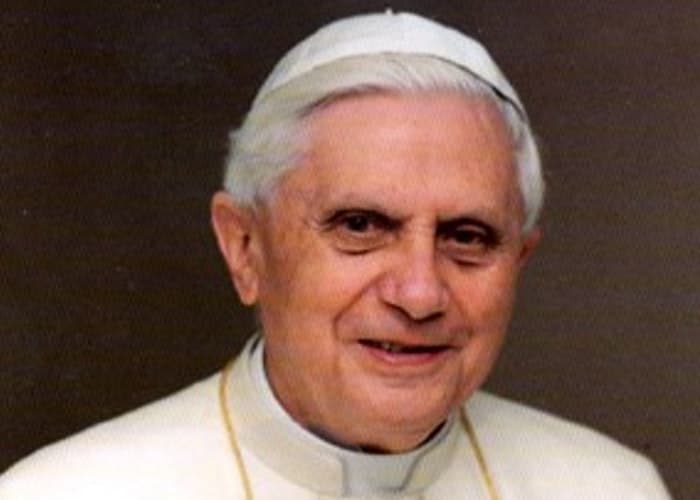
2011
“I am very glad to welcome you on the occasion of the Annual Congress of the Centesimus Annus — Pro Pontifice Foundation which has brought you together for two study days on the theme of the relationship between the family and business.”
“This year is the 20th anniversary of the Encyclical Centesimus Annus of Blessed John Paul II, published 100 years after Rerum Novarum. It is also the 30th anniversary of the Apostolic Exhortation Familiaris Consortio. This double commemoration makes your well chosen theme ever more timely.”
“In the past 120 years of the development of the Church’s social teaching great changes have occurred in the world that were not even imaginable at the time of Pope Leo’s historic Encyclical…Yet, the inner patrimony of the social Magisterium that has always promoted the human person and the family, in the context of their life and business, has not changed with the changing external conditions.”
“As you pointed out in your reports, in the difficult situation in which we live we are unfortunately witnessing a crisis of work and of the economy which is accompanied by a crisis of the family…A new, harmonious synthesis between family and work is therefore necessary, to which the Church’s social doctrine can make its own precious contribution.”
“In his Apostolic Exhortation Familiaris Consortio , Bl. John Paul II pointed out four tasks for the family: forming a community of persons; serving life; participating in the development of society; and sharing in the life and mission of the Church.”
“Family and work are privileged places in which to realize the vocation of human beings to collaborate with God’s creative work today.”
“In the Encyclical Caritas in Veritate I wished to stress that the family model of the logic of love, of free giving and of reciprocal gift, should be extended to a universal dimension…In order for true justice to exist it is necessary to add free giving and solidarity.”
“Dear friends, I hope that the considerations which arose at your Congress will help you to assume ever more actively your role in the spread and application of the Church’s social teaching, without forgetting that ‘development needs Christians with their arms raised towards God in prayer, Christians moved by the knowledge that truth-filled love, caritas in Veritate…is not produced by us, but given to us'”.
“With this wish, as I entrust you to the intercession of the Virgin Mary, I warmly impart to all of you and to your dear ones a special Apostolic Blessing.”
Pope Francis
2013
“I am very glad to meet you on the occasion of the International Conference of the Centesimus Annus Pro Pontifice Foundation on the theme: “Rethinking Solidarity for Employment: the Challenges of the 21st Century”. I cordially greet each one of you.”
“What does ‘rethinking solidarity’ mean? … it seems to me to mean two things: combining the magisterium with social and economic development…Secondly, ‘rethinking’ means deepening knowledge, reflecting further to enhance all the fruitfulness…which draws in depth from the Gospel, that is, from Jesus Christ, and so, as such, contains an inexhaustible potential.”
“Today’s economic and social crisis makes this ‘rethinking’ ever more urgent and highlights even more clearly the truth and timeliness of affirmations of the social magisterium”.
“[T]here is no worse material poverty, I am keen to stress, than the poverty which prevents people from earning their bread and deprives them of the dignity of work…Hence the need ‘to rethink solidarity’…as a global rethinking of the whole system”.
“It is essential to restore to this word ‘solidarity’, viewed askance by the world of economics — as if it were a bad word — the social citizenship that it deserves.”
“The current crisis is not only economic and financial but is rooted in an ethical and anthropological crisis. Concern with the idols of power, profit, and money, rather than with the value of the human person has become a basic norm”.
“We have forgotten and are still forgetting…the human being [who] by virtue of their profound dignity [must be offered] the possibility of living a dignified life and of actively participating in the common good.”
“Benedict XVI reminded us that precisely because it is human, all human activity, including economic activity, must be ethically structured and governed (cf. Encyclical Letter Caritas in Veritate, n. 36).”
“We must return to the centrality of the human being”.
“I…thank you for your commitment to deepening and spreading knowledge of the Church’s social doctrine with your courses and your publications. I think your service to the social magisterium, as lay people who live in society, in the world of economics and work is really beautiful and important.”
“Dear friends, thank you once again for this meeting and for the work you carry out. I assure each one of you, all your loved ones, my remembrance in prayer, as I bless you warmly. Many thanks.”
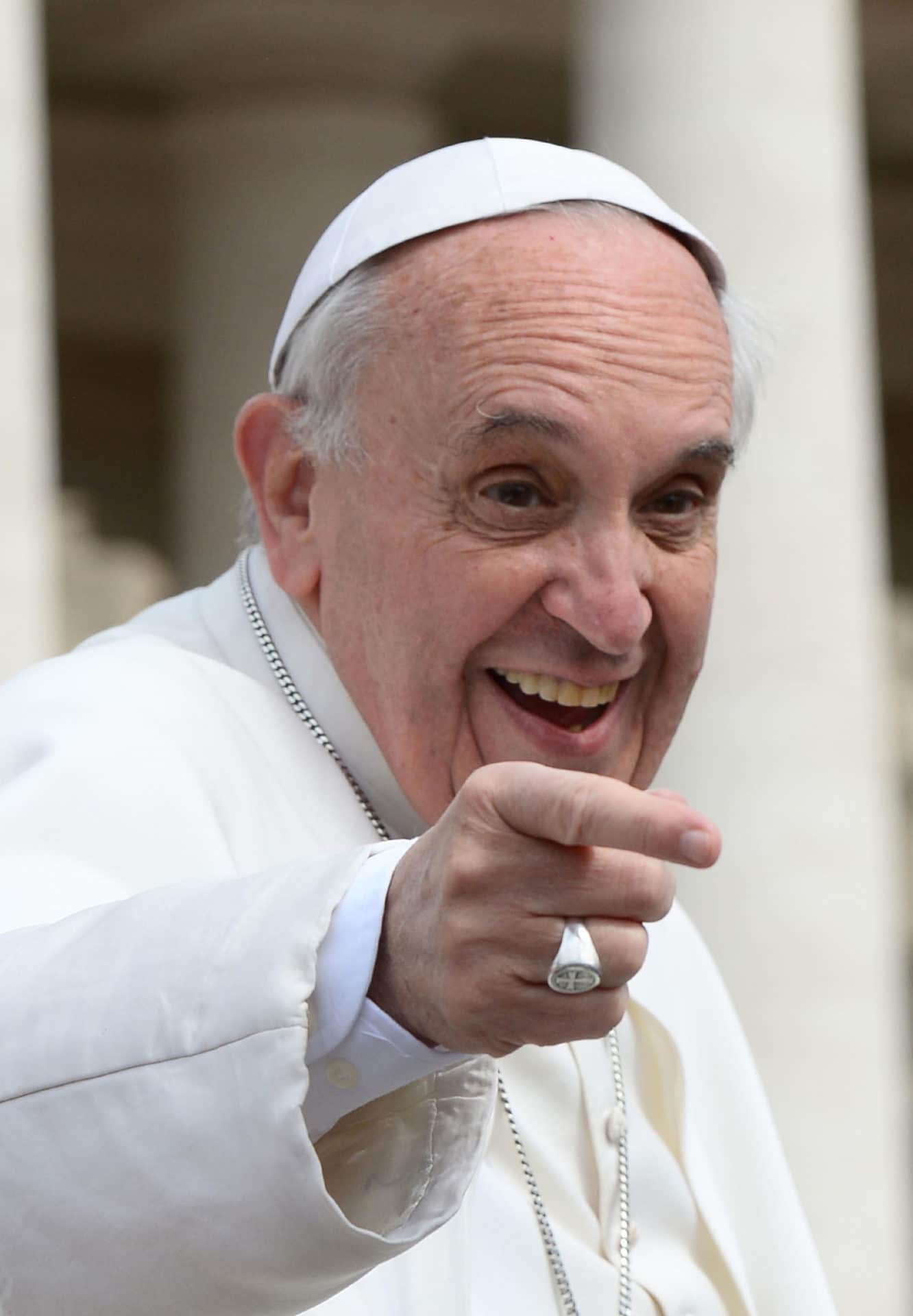
2014
“I welcome all of you, members of the Centesimus Annus – Pro Pontifice Foundation and those taking part in the International Conference…which is a milestone on your path, as you seek to meet some of the current world challenges in light of the social doctrine of the Church.”
“I thank you for having accepted the suggestion to develop the value of solidarity. We thus carry forward a theme of reflection and commitment which is intrinsic to the social doctrine, which is always in harmony with subsidiarity.”
“In the current economic situation — and in the mentality that it generates — the word “solidarity” has become uncomfortable, even bothersome…Last year, I told you it seemed even like a swear word in this context.”
“The cause of the crisis of these current years is of a deep ethical nature that has enhanced this “allergy” to words like solidarity, the equitable distribution of goods, employment as a priority…”.
“And the reason is that one has not succeeded — or does not want to succeed — in really studying how these ethical values could promote concrete economic values”.
“This is precisely what you are trying to do, combining the theoretical and practical aspects, thought and experience […] the Christian businessman is urged to always compare the Gospel with the reality in which he works; and the Gospel asks him to place the human person and the common good first”.
“Dear friends of Centesimus Annus, this is your field of testimony! The Second Vatican Council insisted on the fact that the lay faithful are called to fulfil their mission in the areas of social, economic and political life.”
“This testimony is of the utmost importance, and I encourage you to carry it forward with faith”.
“Last Wednesday I gave a catechesis on the gift of counsel, one of the seven gifts of the Holy Spirit. You also have great need to ask God for this gift, the gift of counsel, to act and make decisions for the greater good.”
“With the help of God and the Church, you can bear effective witness in your field, because you bring not only words and speeches, but also personal and business experience in an attempt to implement the Christian ethical principals in the current situation in the world of labor.”
“May the Virgin Mary, Mater boni consilii, help you, and may my blessing also go with you.”
2015 – CAPP was addressed by His Eminence Pietro Cardinal Parolin, Secretary of State
“We have now come to the end of this most stimulating International Conference of the Centesimus Annus – Pro Pontifice Foundation.”
“This two-day meeting has confirmed once again how your Foundation – by remaining faithful to the responsibility entrusted to it by Saint John Paul II in 1993 – can render valuable service for a wider and better knowledge of the social doctrine of the Church.”
“It does so by promoting the application of this doctrine through robust dialogue among specialists, economists, university instructors and others who bring their life experience to the world of economics.”
“It is important that the Foundation is taking up this challenge with dedication and competence, in the light of the Church’s social teaching. Its main point of reference must be the dignity of the human person and the promotion of the common good…The ethical principles underlying the Church’s social teaching can serve as a scheme of reference and a key to interpretation in this effort.”
“Pope Benedict XVI frequently stated that “every economic decision has a moral consequence” (Caritas in Veritate, 37)…Once again, the key to this is the moral formation of individual persons needed at every level”.
“I am grateful for the opportunity to share with you these reflections. I offer you my best wishes for fruitfulness of the Foundation’s work, which I trust will be oriented ever more fully towards the planning and structuring of the economic and financial sphere within a healthy and robust ethical framework.”
2016
“I offer a warm welcome to all of you”.
“In these days of reflection and dialogue, you have considered the contribution of the business community to the fight against poverty, with particular attention to the current refugee crisis. I am grateful for your readiness to bring your expertise and experience to the discussion of these critical humanitarian issues”.
“The refugee crisis, whose proportions are growing daily, is one especially close to my heart.”
“In my recent visit to Lesbos, I witnessed heartrending scenes of human suffering, especially on the part of families and children. It was my intention…to make the world more aware of these ‘scenes of tragic and indeed desperate need’, and to ‘respond in a way worthy of our common humanity’.”
“As Saint John Paul II frequently insisted, economic activity cannot be conducted in an institutional or political vacuum (Centesimus Annus, 48), but has an essential ethical component; it must always stand at the service of the human person and the universal common good.”
“An economic vision geared to profit and material well-being alone is…incapable of contributing in a positive way to a globalization that favors the integral development of the world’s peoples…An economy of exclusion and inequality (Evangelii Gaudium, 53) has led to
greater numbers of the disenfranchised and those discarded as unproductive and useless.”
“The effects are felt even in our more developed societies, in which the growth of relative poverty and social decay represent a serious threat to families, the shrinking middle class and in a particular way our young people…our youth are being robbed of hope and their great resources of energy, creativity and vision are being squandered.”
“In the light of this demanding task, this initiative of your Foundation is most timely. Drawing inspiration from the rich patrimony of the Church’s social doctrine, the present Conference is exploring from various standpoints the practical and ethical implications of the present world economy, while at the same time laying the foundations for a business and economic culture that is more inclusive and respectful of human dignity.”
“It is my hope that your Conference will contribute to generating new models of economic progress more clearly directed to the universal common good, inclusion and integral development, the creation of labor and investment in human resources.”
“Yours is in fact a vocation at the service of human dignity and the building of a world of authentic solidarity…may your work always contribute to the growth of that civilization of love which embraces the entire human family in justice and peace.”
“Upon all of you, and your families, I invoke the Lord’s blessings of wisdom, joy and strength.”
2017
“I offer you a warm welcome on the occasion of the International Conference of the Centesimus Annus Pro Pontifice Foundation”.
“I express my appreciation for your efforts to seek other ways of understanding the economy and progress, and business, to meet the ethical challenges posed by the imposition of new paradigms and forms of power (Laudato Si’, 16).”
“Your Foundation is also making a valuable contribution precisely by approaching business and finances both in the light of the rich heritage of the Church’s social doctrine and the intelligent search for ‘constructive alternatives’…you are committed to developing models of economic growth centered on the dignity, freedom and creativity that are the hallmark of the human person.”
“In these days, you have paid particular attention to the critical issue of job creation in the context of the ongoing new technological revolution…This has reached a very grave point, very grave. It is a problem that has reached truly dramatic proportions in both developed and developing countries and needs to be addressed”.
“In a similar way, efforts to address the complex of issues…must take into account not only individuals but families as well. This, as you know, was a concern expressed by the recent Synod assemblies on the family (Amoris Laetitia , 44)”.
“Your Foundation’s 2017 Statement rightly notes that the fight against poverty demands a better understanding of the reality of poverty as a human and not merely economic phenomenon…This calls for the creation…of mediating structures capable of bringing people and resources together, initiating processes in which the poor are the principal actors and beneficiaries. Such a person-based approach to economic activity will encourage…and thus favor social inclusion and the growth of a culture of effective solidarity.”
“Dear friends, I encourage you, I encourage your efforts to bring the light of the Gospel and the richness of the Church’s social teaching to these pressing issues by contributing to informed discussion, dialogue and research, but also by committing yourselves for that change of attitudes, opinions and lifestyles which is essential for building a world of greater justice, freedom and harmony.”
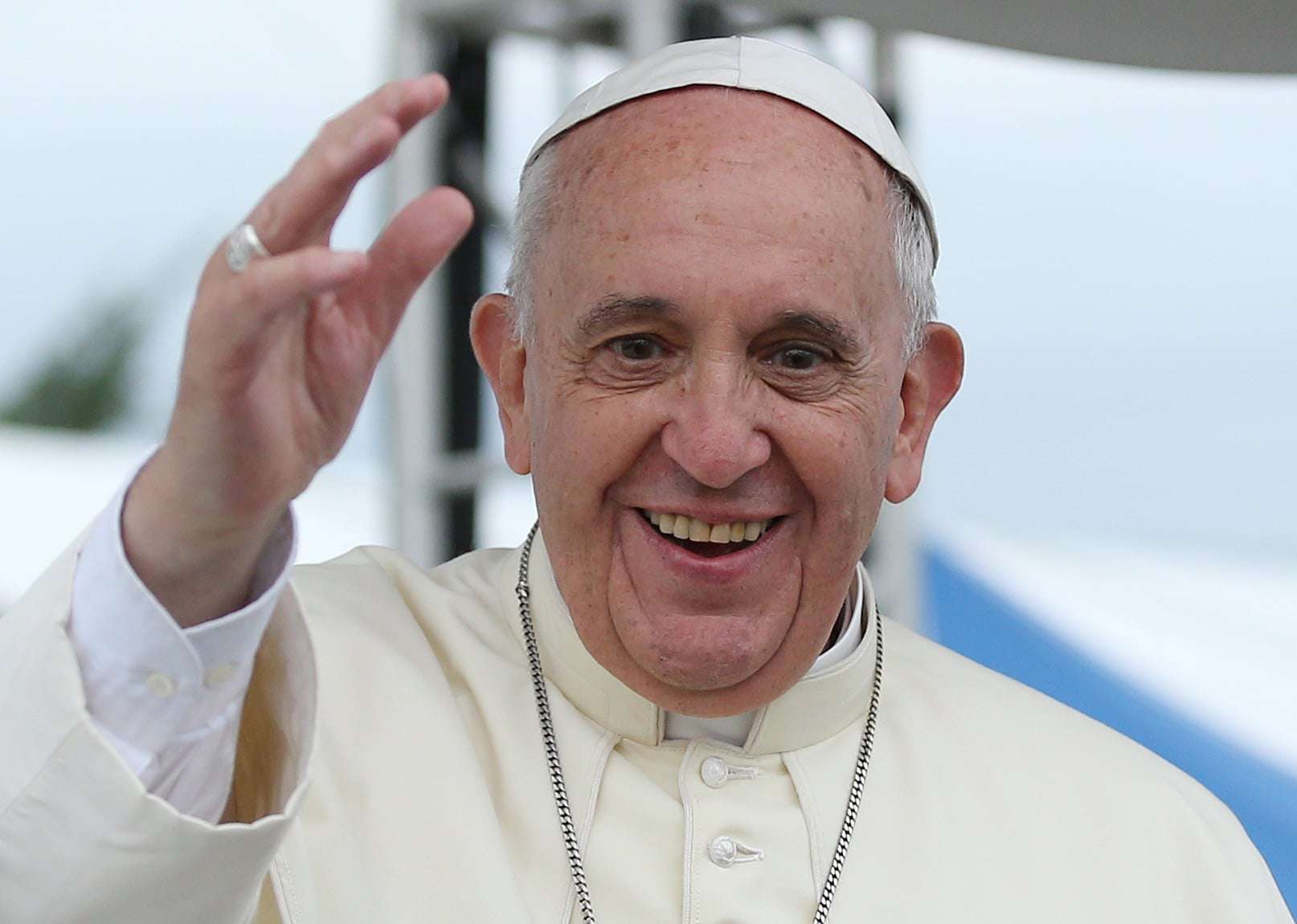
2018 – 25th Anniversary of FCAPP’s Founding
“I greet all of you gathered for the 2018 International Conference of the Centesimus Annus Pro Pontifice Foundation.”
“In a particular way, in this, the twenty-fifth anniversary of the Foundation’s establishment by Saint John Paul II, I express my gratitude for your work in making known the wisdom of the Church’s social teaching…After a quarter-century, this task remains more necessary than ever”.
“Your Conference has chosen for its title this year ‘New Policies and Lifestyles in the Digital Age’… As the preparation process for this year’s Synod on Young People has made clear, this is a vital area”.
“Your Foundation has a vital role to play in bringing the light of the Gospel message to these pressing humanitarian concerns, and in assisting the Church to carry out this essential aspect of her mission.”
“The current difficulties and crises within the global economic system have an undeniable ethical dimension: they are related to a mentality of egoism and exclusion that has effectively created a culture of waste blind to the human dignity of the most vulnerable…I think too of the urgent ethical issues associated with global movements of migration.”
“All too often, a tragic and false dichotomy – analogous to the artificial rift between science and faith – has developed between the ethical teachings of our religious traditions and the practical concerns of today’s business community.”
“By continuing to engage with business and finance leaders, as well as union officials and others in the public sector, you seek to ensure that the intrinsic social dimension of all economic activity is adequately safeguarded and effectively promoted.”
“Dear friends, by sharing your own knowledge and expertise, and by making known the richness of the Church’s social doctrine, you seek to form the consciences of leaders in the political, social and economic sectors. I encourage you to persevere in these efforts”.
“Your own contribution is a privileged expression of the Church’s concern for the future of young people and families. Indeed, this is an activity where ecumenical cooperation is of especial importance and the presence of Patriarch Bartholomew of Constantinople at your
Conference is an eloquent sign of this common responsibility.”
“With gratitude and appreciation for what you have already accomplished, I prayerfully entrust your future commitment to the providence of Almighty God. Upon you, your colleagues and your families I willingly invoke an abundance of the Lord’s blessings.”
2019
“I am pleased to offer a warm welcome to all of you who are present for the 2019 International Conference of the Centesimus Annus pro Pontifice Foundation. I thank the organizers and those who have taken part in the discussions you have held on fostering an integral ecology.”
“Your Conference this year has chosen to reflect on the Encyclical Letter Laudato Si’ and the call to a conversion of minds and hearts […] Laudato Si’ is not a “green” encyclical: it is a social encyclical. Don’t forget this.”
“[A] number of challenges and issues still remain […] Improper use of natural resources and models of development that are not inclusive and sustainable continue to have negative effects on poverty, social growth and social equality…Moreover, the common good is placed in jeopardy by attitudes of unbridled individualism, consumption and wastefulness.”
“For this reason, the word “conversion” assumes a special importance in our present situation. Adequate responses to current problems cannot be superficial. Rather, what is needed is precisely a conversion, a “turning around”, that is, a transformation of hearts and minds…a renewed ethical vision, one that places persons at the center, desiring to leave no one on the margins of life.”
“The task that lies before us is to change ‘models of global development’ opening a new dialogue on the future of our planet.”
“May your discussions and ongoing work bear fruit in helping to bring about a deep transformation at all levels of our contemporary societies: individuals, corporations, institutions and politics. Although this task seems daunting, I encourage you not to lose hope, for that hope is based upon the merciful love of our Father in heaven.”
“Dear friends, with these sentiments, I entrust all of you, together with your families, to the loving intercession of Mary, Mother of the Church, and I cordially impart my Apostolic Blessing as a pledge of joy and peace in Christ our Risen Savior. I ask you, please pray for me. Thank you.”
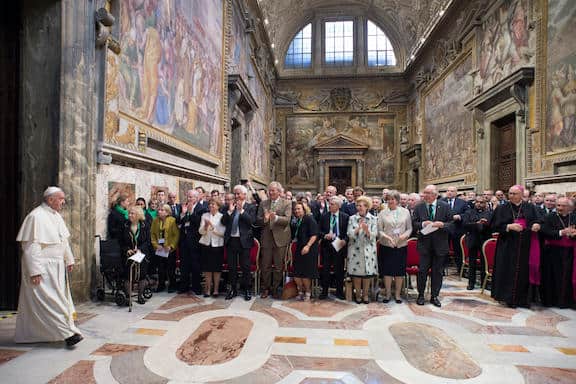
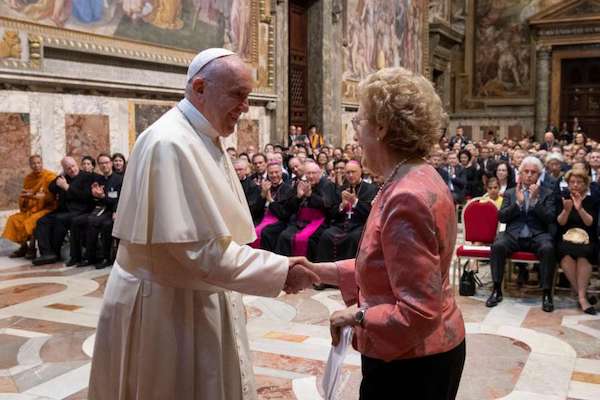
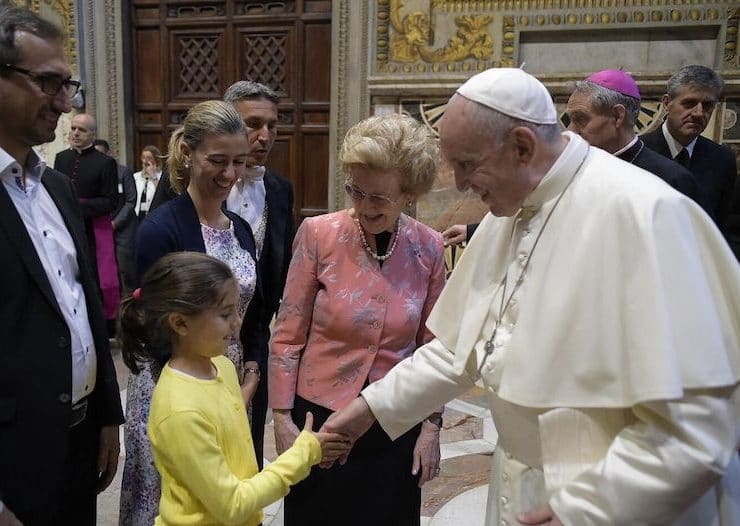
2021
“I am pleased that we can be with one another”.
“In these days, you are discussing significant, and indeed fundamental, issues…The three words you have chosen – solidarity, cooperation and responsibility – represent three pillars of the Church’s social teaching…Three words that recall the mystery of God himself, who, as Trinity, a communion of persons, inspires us to find our fulfilment in generous openness to others (solidarity), through collaboration with others (cooperation) and through commitment to others (responsibility).”
“Based on this vision…the Church’s teaching contributes to a vision of the world opposed to individualistic visions, since it is based on the interplay between persons and directed to th common good…These are timely issues…In the face of this, we cannot remain indifferent.”
“[T]today more than ever, we are bound to witness our concern for others…and to commit ourselves freely to the development of a more just and equitable society…our response to injustice and exploitation must be…the active promotion of the good [and] For this reason, I am most appreciative of your work”.
“We need possibilities able to become realities, and realities able to offer hope. This means putting into practice the social teaching of the Church…Let us once more become passionate about that teaching, let us make it known, for it is a treasure of the Church’s tradition!”
“This is not simply a matter of ‘politics’; the Church’s social teaching is grounded in the word of God and seeks to promote integral human development on the basis of our faith in the God who became man. For this reason, it should be practiced, cherished and developed”.
God “inspires us to do this in every aspect of our life in society…In every sphere of life we are called to be vigilant in upholding respect for the human person and his or her freedom, and in safeguarding his or her inviolable dignity. This is the mission of implementing the Church’s social doctrine.”
“Four years ago a distinguished economist who had also worked in government came to see me. She told me that she had tried to create a dialogue between…finance, humanism, and religion, yet…could not even begin. Interesting. That made me think. This economist made me feel that finance was something impractical, something “fluid”, “ephemeral” that ends up like a chain letter. I share this experience with you and perhaps it may help you.”
“Dear friends, in promoting these values and this way of living we often find ourselves going against the grain yet let us always remember that we are not alone. God has drawn near to us. Not merely in words, but by his very presence: in Jesus, God became incarnate…. This universal communion inspires us, as a believing community, to cooperate readily with everyone for the common good: without forms of rejection, exclusivity, or prejudice.”
“As Christians, we are called to a love that transcends borders and limits; we are called to be a sign and witness that it is possible to pass beyond the walls of selfishness and personal and national interest. Beyond the power of money that often decides the destiny of peoples; beyond ideological divisions that foster hatred; beyond all historical and cultural barriers and, above all, beyond indifference, that culture of indifference which, sadly, we experience daily.”
“This may seem to be an unrealistic utopia. But we prefer to believe that it is a dream that can come true. For it is the dream of the triune God. With his help, it is a dream that can begin to become reality, also in our world.”
“Building a more solidary, just and equitable world is…the way to embody our faith, to praise the God who loves men and women, who loves life.”
“Dear brothers and sisters, the good that you do for every person on earth brings joy to the heart of God in heaven. Continue resolutely on this path.”
“I accompany you with my prayers and I bless you in your work. And I ask you, please, not to forget to pray for me. Thank you.”

